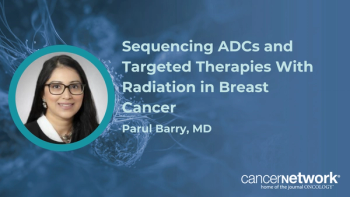
Pembrolizumab Plus Chemo Boosts Response in Triple-Negative Breast Cancer
Adding the immunotherapy pembrolizumab to neoadjuvant chemotherapy improved the pathological complete response rate in patients with early triple-negative breast cancer, according to findings of a study presented at ESMO.
Adding the immunotherapy pembrolizumab (Keytruda) to neoadjuvant chemotherapy improved the pathological complete response rate in patients with early triple-negative
Data also indicated improvement in event-free survival, an important outcome in patients with triple-negative disease, which often recurs early on, experts said.
The study included 1,174 patients with triple-negative disease and randomly assigned them 2:1 to pembrolizumab 200 mg three times a week or placebo, both in combination with 4 cycles of paclitaxel plus carboplatin, then 4 cycles of doxorubicin or epirubicin plus cyclophosphamide. After surgery, patients received pembrolizumab or placebo for 9 cycles or until disease recurrence or unacceptable toxicity, according to the results.
Median follow-up was 15.5 months. Pathological complete response was evaluable in 602 patients. The combination of pembrolizumab plus chemotherapy significantly improved pathologic complete response from 51.2% with placebo to 64.8% with the combination (P=.00055).
“We found a 13.6% difference which is a clinically meaningful benefit,” study author Peter Schmid, MD, PhD, of Barts Cancer Institute, Queen Mary University of London, UK, said in a press release.
Patients assigned to the combination also saw a trend toward improved event-free survival (HR=0.63; 95% CI, 0.43-0.93).
“These are preliminary data, but they provide a strong sign that the addition of immune therapy to neoadjuvant chemotherapy prevents breast cancer recurrence,” Schmid said in the release. “If we prevent recurrence, we cure more patients, but we need longer-term data for confirmation.”
Looking at results by PD-L1 status, the immunotherapy combination resulted in a pathologic complete response rate of 68.9% compared with 54.9% for placebo in the PD-L1-positive population, and 45.3% compared with 30.3% in the PD-L1-negative population.
Commenting on the results for ESMO, Prof Fabrice André, Institut Gustave Roussy, Villejuif, France, said, “This is a good situation to test whether the FDA will approve a drug for triple negative breast cancer based on pathological complete response. The combination of the anti-PD-1 monoclonal antibody pembrolizumab plus chemotherapy could become a standard of care if approved.”
Newsletter
Stay up to date on recent advances in the multidisciplinary approach to cancer.





































